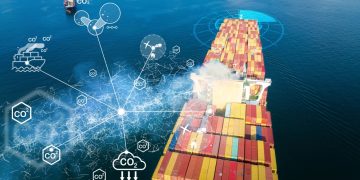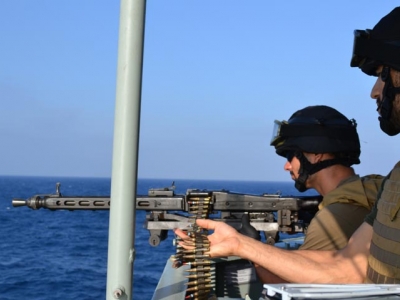Agreed by IMO MSC 90
Interim guidance for private maritime security companies (PMSCs) was agreed by IMO’s Maritime Safety Committee (MSC), when it met at the Organization’s London Headquarters for its 90th session from 16 to 25 May 2012.
The MSC also adopted a resolution recommending operational measures aimed at enhancing the safety of large cruise passenger ships, as well as a work plan to address passenger ship safety matters, in the wake of the Costa Concordia incident in January.
The busy agenda further saw the adoption of amendments to the International Convention for the Safety of Life at Sea (SOLAS) and adoption and approval of other guidelines, codes and circulars, submitted by the IMO Sub-Committees.
Piracy and armed robbery against ships
The MSC agreed Interim Guidance to private maritime security companies (PMSC) providing privately contracted armed security personnel (PCASP) aboard vessels transiting the high-risk area off the east coast of Africa.
Passenger ship safety
The MSC agreed that a number of operational measures should be implemented immediately, on a voluntary basis, prior to the adoption of any measures following the analysis of the official marine investigation report into the loss of the Costa Concordia (
Adoption of SOLAS amendments
The MSC adopted the following amendments, with expected entry into force on 1 January 2014:
SOLAS regulation II-1/8-1, to introduce a mandatory requirement for new passenger ships for either onboard stability computers or shore-based support, for the purpose of providing operational information to the Master for safe return to port after a flooding casualty;
SOLAS regulation III/20.11.2 regarding the testing of free-fall lifeboats, to require that the operational testing of free-fall lifeboat release systems shall be performed either by free-fall launch with only the operating crew on board or by a simulated launching. A related circular encouraging early implementation of the amendment was also approved;
SOLAS regulation V/14 on ships’ manning, to require Administrations, for every ship, to establish appropriate minimum safe manning levels following a transparent procedure, taking into account the guidance adopted by IMO (Assembly resolution A.1047(27) on Principles of minimum safe manning); and issue an appropriate minimum safe manning document or equivalent as evidence of the minimum safe manning considered necessary;
SOLAS chapter VI to add a new SOLAS regulation VI/5-2, to prohibit the blending of bulk liquid cargoes during the sea voyage and to prohibit production processes on board ships;
SOLAS chapter VII to replace regulation 4 on documents, covering transport information relating to the carriage of dangerous goods in packaged form and the container/vehicle packing certificate; and
SOLAS chapter XI-1 regulation XI-1/2 on enhanced surveys, to make mandatory the International Code on the Enhanced Programme of Inspections during Surveys of Bulk Carriers and Oil Tankers, 2011 (2011 ESP Code, resolution A.1049(27)).
Adoption of Load Lines amendments
The MSC adopted amendments to regulation 47 of the International Convention on Load Lines (LL), 1966 and the 1988 LL Protocol, to shift the Winter Seasonal Zone off the southern tip of Africa further southward by 50 miles.
The amendments to the 1988 LL Protocol are expected to enter into force on 1 January 2014 under the tacit acceptance procedure.
The amendments to the Convention, which require positive acceptance by two-thirds of Contracting Parties to enter into force, will now be submitted to the next session of the IMO Assembly for adoption, as required by the Convention.
Adoption of amendments to Codes mandatory under the SOLAS Convention
The MSC adopted amendments to the following Codes, with expected entry into force on1 January 2014:
International Code of Safety for High-Speed Craft, 2000 (2000 HSC Code), relating to radiocommunication, on testing of satellite EPIRBs.
International Code for Fire Safety Systems (FSS Code), relating to fixed foam fire extinguishing systems; and automatic sprinkler, fire detection and fire alarm systems.
International Maritime Dangerous Goods (IMDG) Code and supplements (amendment 36-12), including harmonization of the Code with the amendments to the UN Recommendations on the transport of dangerous goods, seventeenth revised edition. Amendment 36-12 will enter into force on 1 January 2014, but Contracting Governments may apply the aforementioned amendments in whole or in part on a voluntary basis from 1 January 2013.
LRIT status updated
The MSC was updated on developments in relation to the establishment and testing of LRIT Data Centres (DCs) and the operation of the LRIT system since its last session. The MSC was informed that the International LRIT Data Exchange (IDE) had been fully operational at the European Maritime Safety Agency (EMSA) premises, in Lisbon (Portugal), since 18 October 2011. The offer of the European Union States for the continued hosting, maintenance and operation of the IDE by EMSA, beyond 2013, at no cost either to the SOLAS Contracting Governments or to the Organization, was welcomed by the Committee.
An overview of the IDE operations (status as at November 2011) showed that 66 LRIT Data Centres were connected to the IDE; 275,000 messages were processed per week by the IDE (30 messages/minute); 111 SOLAS Contracting Governments and overseas territories to which the 1974 SOLAS Convention has been extended and 325 Search and Rescue services were users of the IDE; and the average processing time per message was less than one second.
The MSC also welcomed the offer of the United States to continue hosting, maintaining and operating the disaster recovery site of the IDE, beyond 2013, subject to their national procurement regulations, at no cost either to the SOLAS Contracting Governments or to the Organization, with the understanding that they reserved the right to revisit their decision should the circumstances associated with the configuration and operation of the permanent IDE change in the future.
The Committee adopted updated and amended performance standards for LRIT and approved a number of updated and amended circulars relating to LRIT operations.
STCW Convention: independent evaluations considered
The MSC considered the Secretary-General’s report on a number of countries whose independent evaluations have been completed since the previous MSC meeting and confirmed that 12 STCW Parties and five overseas territories of one STCW Party continued to give full and complete effect to the provisions of the International Convention on Standards of Training, Certification and Watchkeeping for Seafarers (STCW), 1978, as amended.
Goal-based standards implementation discussed
The MSC established a Correspondence Group on Goal-Based Standards to develop draft guidelines for the approval of equivalents and alternatives as provided for in various IMO instruments, and endorsed a work plan for the development of interim guidelines for the safety level approach. A working group on goal-based standards will be established at MSC 91 to further consider matters related to the safety level approach and the draft guidelines to be developed by the correspondence group.
Other issues
In connection with other issues arising from the reports of IMO Sub-Committees and other bodies, the MSC also:
Adopted revised performance standards for voyage data recorders (VDRs) to update the current performance standards (resolution A.861(20), as amended by resolution MSC.214(81)) and provide for VDRs to continuously maintain sequential records of preselected data items relating to the status and output of the ship’s equipment, and command and control of the ship in a fixed recording medium; a float-free recording medium; and a long-term recording medium.
Adopted several new and amended ships’ routeing measures.
Approved, for adoption at MSC 91, new draft SOLAS requirements (new regulation III/17-1) to require ships to have plans and procedures to recover persons from the water, as well as related Guidelines for development of plans and procedures for recovery of persons from the water. Also, approved a draft MSC resolution on Implementation of SOLAS regulation III/17-1 to ships other than those engaged in international voyages.
Approved, for adoption at MSC 91, the draft revised Code on noise levels on board ships, which sets out mandatory noise level limits for machinery spaces, control rooms, workshops, accommodation and other spaces on board ships, updates and revises the previous version published in 1973 (resolution A.468(XII)). Also approved, for adoption at MSC 91, a related draft new SOLAS regulation II-1/3 12 to require new ships to be constructed to reduce onboard noise and to protect personnel from noise, in accordance with the Code.
Approved Unified Interpretations of the Convention on the International Regulations for Preventing Collisions at Sea, 1972, as amended (COLREG), relating to navigation-light arrangements (described in Annex I/9(a)(i) and 10(a)(i) of COLREG).
Approved an MSC circular on Pilot transfer arrangements, which includes a revised graphic depiction of required boarding arrangements for pilots, reflecting amendments adopted to SOLAS regulation V/23 by MSC 88 in 2010 and Assembly resolution A.1045(27) on Pilot transfer arrangements.
Adopted an MSC resolution on amendments to performance standards for speed and distance measuring equipment, to add a new paragraph referring to the need for two separate devices, if ships are required to carry speed logs measuring speed through the water and speed over the ground. Also, approved a related draft MSC circular on the interpretation of SOLAS regulation V/19.2.9.2, to clarify the requirement for two separate devices.
Approved MSC circulars on Revised Guidelines for the design and approval of fixed water-based fire-fighting systems for ro-ro spaces and special category spaces; Guidelines for the approval of helicopter facility foam fire-fighting appliances; and Revised Guidelines for the maintenance and inspection of fire-protection systems and appliances.
Adopted amendments to the Guidelines for the design and construction of offshore supply vessels, 2006 (resolution MSC.235(82)), concerning damage stability standards.
Approved, for future adoption, draft amendments to SOLAS regulation II-2/10 on fire fighting to require a minimum of duplicate two-way portable radiotelephone apparatus for fire fighters’ communication to be carried; and draft amendments to regulation II-2/15 Instructions, on-board training and drills, to require an onboard means of recharging breathing apparatus cylinders used during drills, or a suitable number of spare cylinders.
Approved an MSC circular on Basic Safety Guidance for yacht races or oceanic voyages by non-regulated crafts.
Approved an MSC circular on Guidance to prospective GMDSS satellite service providers.
Approved amendments to the International Aeronautical and
Maritime Search and Rescue (IAMSAR) Manual for inclusion in the 2013 edition of the IAMSAR Manual and decided that the amendments should become applicable on 1 June 2013. The amendments include revised paragraphs relating to common language (English serves as the default SAR operational language in all cross-boundary operations where there is no other common language) and references to 406 MHz Distress Beacons.
Approved an MSC circular on Revised Guidelines on annual testing of 406 MHz satellite EPIRBs.
Agreed, in principle, to draft MSC-MEPC circulars on the Revised Guidelines for Formal Safety Assessment (FSA) for use in the IMO rulemaking process (Revised FSA Guidelines), and on the Guidelines for the application of Human Element Analysing Process (HEAP) to the IMO rule making process (HEAP Guidelines).
Agreed that the Global Maritime Distress and Safety System (GMDSS) should be reviewed and included an item on Review and modernization of the Global Maritime Distress and Safety System (GMDSS), with a target completion year of 2017, on the agenda of the Sub-Committees on Radiocommunications, Search and Rescue (COMSAR), Safety of Navigation (NAV) and Standards of Training and Watchkeeping (STW), assigning the COMSAR Sub Committee as the coordinating organ.
In recognition of recent incidents associated with the liquefaction of cargoes, approved an MSC circular on Interim measures for early implementation of the draft amendments to the International Maritime Solid Bulk Cargoes (IMSBC) Code, recommending the early voluntary implementation of proposed draft amendments to the IMSBC Code, set to be adopted in 2013, relating to the carriage of a concentrate or other cargo which may liquefy.
Source: IMO































































